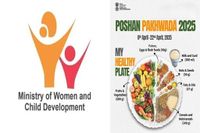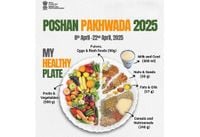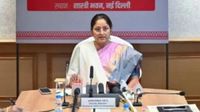New Delhi: The Ministry of Women and Child Development (MWCD) is set to celebrate the 7th edition of Poshan Pakhwada from April 8 to April 22, 2025, as part of the Government of India’s ongoing commitment to addressing malnutrition. This year’s Poshan Pakhwada will emphasize four key themes: a focus on the First 1000 Days of Life, popularization of the Beneficiary Module of the Poshan Tracker, Management of Malnutrition through Community-Based Management of Acute Malnutrition (CMAM), and promoting Healthy Lifestyles to Address Childhood Obesity.
Since its inception in 2018, the initiative has seen over 100 crore sensitization activities conducted during PoshanMaah and Poshan Pakhwada, fostering a Jan Andolan (people's movement) for a well-nourished India. The campaign aims to strengthen service delivery and community participation through village-level health drives, home visits, and awareness camps. Union Minister of State for Women and Child Development Savitri Thakur will inaugurate the program with a nationwide webcast, addressing officials from 18 partner ministries, state women and child development departments, and Anganwadi workers.
Union Women and Child Development Minister Annpurna Devi is scheduled to visit Arunachal Pradesh in the first week of the campaign to assess ongoing nutrition and child welfare initiatives. Her visit underscores the government’s emphasis on regional outreach and targeted support to vulnerable groups, according to an official statement. The campaign is part of the broader Mission Saksham Anganwadi and Poshan 2.0, which aims to combat malnutrition and improve nutritional outcomes for pregnant women, lactating mothers, adolescent girls, and children under the age of six.
This year’s Pakhwada will spotlight the First 1000 Days of Life, emphasizing maternal and child nutrition from conception to age two to break the intergenerational cycle of malnutrition. The Popularization of the Beneficiary Module will encourage self-registration of eligible individuals on the Poshan Tracker Application, aiming to increase registrations and reduce pendency. Additionally, the Management of Malnutrition via the CMAM Protocol will enhance community-level identification, referral, and follow-up of malnourished children.
To tackle the growing concern of childhood obesity, the campaign will raise awareness on obesity as a public health issue and promote preventive strategies through community-based events. The Pakhwada will be supported by a robust media campaign, including nukkad nataks (street plays), jingles, radio programs, and social media engagement to boost awareness and participation.
As part of the initiative, various ministries, departments, and state administrations have been urged to establish feeding rooms and changing rooms for women and children at public places. This move aims to improve facilities for mothers and young children, ensuring a more inclusive environment.
With a united effort across ministries and community stakeholders, Poshan Pakhwada 2025 aims to accelerate progress towards a Suposhit Bharat (well-nourished India), focusing on pregnant women, children, adolescents, and underserved populations. The campaign is expected to bring together various stakeholders to improve nutrition outcomes at the grassroots through home visits, community outreach programs, identification drives, and camps at the village, block, and district levels.
Community engagement will be crucial in this effort, with a focus on educating the community about holistic nutrition, promoting exclusive breastfeeding and complementary feeding, and popularizing the beneficiary module of the Poshan Tracker as a tool for community empowerment and involvement.
Since the launch of Poshan Abhiyaan, six successful Poshan Pakhwada events have already been held across the country, reflecting the government’s commitment to improving nutritional outcomes. The activities planned by various States and Union Territories during Poshan Pakhwada 2025 will strongly reflect the spirit of ‘Ek Bharat Shreshtha Bharat’ (One India, Great India).
As the Pakhwada kicks off, officials and community leaders are encouraged to participate actively and leverage this opportunity to foster a culture of health and nutrition awareness. The overarching goal remains clear: to combat malnutrition and ensure that every child and mother receives the support and resources they need to thrive.








